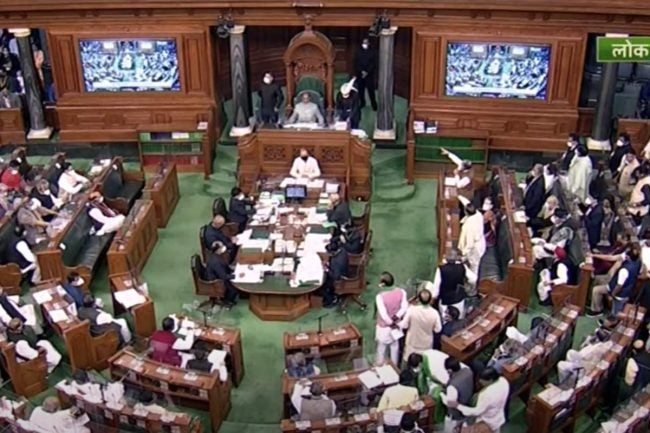Repeal of the Farm Laws: Haste shows up Parliament’s Failings
Ronojoy Sen
10 January 2022Summary
The 2021 winter session of Indian parliament saw the repeal of the controversial farm laws. The haste with which the repeal bill was passed mirrored the way it was originally legislated and undermined both parliamentary procedure and the parliament itself.
The winter session of Indian parliament, held from 29 November to 22 December 2021, which was also the last session of the year, was marred by disruptions. The disruptions occurred primarily over the suspension on the first day of the session of 12 opposition members in the Rajya Sabha (Upper House) for misconduct in the earlier monsoon session. However, amidst the disruptions, the government successfully passed the legislation to repeal the controversial farm laws, a decision that had been announced by Prime Minister Narendra Modi on 19 November 2021. The Farm Laws Repeal Bill was one among 10 Bills that were passed in the winter session.
The Procedure
A law is reversed when the parliament formally decides there is no longer a need for the law to exist. A legislation can also have a sunset clause, a date after which it is removed from the rulebook. For laws without a sunset clause, the parliament has to pass another legislation to repeal the law. Article 245 of the Constitution, which gives the parliament the power to make laws, also gives it the power to repeal them through the Repealing and Amending Act, 1950.
Laws can be repealed either through an ordinance or legislation. In the former instance, an ordinance needs to be replaced by a law passed by the parliament within six months. The Repealing and Amending (Amendment) Bill has to pass through the same procedure as any other bill. It has to be cleared by both houses of the parliament before the President gives his assent to make it a law. The Bharatiya Janata Party (BJP) government had invoked the repealing and amending provision in 2019 when it repealed 58 “obsolete” laws. The government has until now passed six Repealing and Amending Acts since it came to power in 2014, nullifying over 1,400 statutes.
The repeal of the three farm laws is not the first time the Modi government has had to back down. During Modi’s first year in office as prime minister, the BJP government had promulgated an ordinance to make amendments to the Right to Fair Compensation and Transparency in Land Acquisition, Rehabilitation and Resettlement Act, 2013, passed by the previous Congress-led United Progressive Alliance government.
The amendment bill was referred to a Joint Parliamentary Committee (JPC). However, after Modi announced in 2015, in a similar fashion to the farm laws repeal, that the bill would be allowed to lapse, the JPC lost its relevance. The official website of the parliament has no updated information regarding the meetings, composition or any report from the committee. All that the website says is that “The draft report is under consideration.”
Conclusion
The farm bills had been pushed through the parliament in 2020 without committee scrutiny. Arguably, the bypassing of parliamentary scrutiny and the absence of public deliberations was one of the reasons for the widespread protests against the farm laws. It was also one of several bills that were introduced and passed on the same day. In the case of the farm bills, the presiding officer in the Rajya Sabha ignored demands for a division of vote and the bills were passed by a voice vote. As analysts have noted, this was not just a matter of procedure, but also an abandonment of established process. Ironically, when the government repealed the farm bills in the 2021 winter session, it again allowed no debate on the floor of the parliament. In fact, the Farm Laws Repeal Bill was passed in three minutes in the Lok Sabha and in nine minutes in the Rajya Sabha, once again diminishing the role of the parliament in deliberating on and ratifying legislation.
According to PRS Legislative Research, during the 2021 monsoon session, on average, a bill was passed in the Lok Sabha in 34 minutes. Of these, 14 bills were passed in less than 10 minutes. Overall in the 17th Lok Sabha, 35 per cent of bills have been passed in less than 30 minutes. Fewer bills are also being referred to a parliamentary committee with only 13 per cent of bills in the 17th Lok Sabha having been sent to a committee.
While the government has blamed the opposition for not letting the House function, the manner in which legislation is being passed has undermined parliamentary procedure and indeed the parliament itself.
. . . . . .
Dr Ronojoy Sen is Senior Research Fellow and Research Lead (Politics, Society and Governance) at the Institute of South Asian Studies (ISAS), an autonomous research institute at the National University of Singapore (NUS). He can be contacted at isasrs@nus.edu.sg. Mr Anurag Tiwary, a research intern at ISAS, assisted him with the research. The authors bear full responsibility for the facts cited and opinions expressed in this paper.
Photo credit: Screen grab
-
 More From :
More From :
-
 Tags :
Tags :
-
 Download PDF
Download PDF



